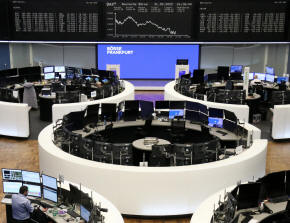Europe buckles up for ECB 'liftoff' signal
 Send a link to a friend
Send a link to a friend
 [June 09, 2022] By
Marc Jones [June 09, 2022] By
Marc Jones
LONDON (Reuters) - Investors buckled up on
Thursday for the European Central Bank’s signal that it is ready to
raise interest rates for the first time in a decade, while the yen
weakened to a new 20-year low on bets the Bank of Japan will lag way
behind.
There was little else worth focusing on. How fast the ECB will now lift
the euro zone's sub-zero borrowing costs has dominated markets for
months, coming as part of the most widespread tightening of global
monetary policy in decades.
Bond dealers marked the moment by pushing Germany's 10-year government
bond yield - the main proxy for European borrowing rates - to its
highest level in nearly eight years. Stocks steadied after an early 1%
slip [.EU]. The euro barely budged. [/FRX]
With euro zone inflation at a record-high 8.1% and broadening quickly,
the ECB has already flagged a series of moves, including also ending its
long-running asset buying programme at the end of this month. Details
will be crucial though.
Economists wonder whether it might risk its first half-point rise in 22
years when its starts the hiking process, most likely next month. There
has also been speculation it will try to protect former debt crisis
countries where borrowing costs have been veering up faster again.
"The bar has been set pretty high by the drum beat of recent comments
(from top ECB policymakers)," said Saxo Bank's head of head of FX
strategy John Hardy, referring to signals that rates will start rising
next month, possibly by a meaty 50 bps.

"So it is about A) do they clear that bar, and B) how does market
react.... I don't think they (ECB) will want to take anything off the
table."
Small but broad-based losses in European stocks were led by miners as
China imposed new COVID lockdown measures in Shanghai, while the
financials sector was the sole gainer on hopes banks will soon be able
to charge higher lending rates.[.EU][O/R]
Asian stocks had fallen overnight and Wall Street futures were flat[.N],
although it was more to do with the renewed rise in both global bond
yields and the dollar, that will ultimately mean tighter financial
conditions.
MSCI's broadest index of Asia-Pacific shares outside Japan was closing
down 0.65%, with Australian shares down 1.2% and Seoul's KOSPI 0.5%
lower. Hong Kong's Hang Seng turned around from small gains to fall
0.75% and Chinese A-shares fell 1%
"It's classic pre-central-bank-meeting price action," said Matt Simpson,
senior market analyst at City Index in Sydney, again referring to the
1145 GMT and 1230 GMT and ECB announcement and news conference.
"It's the most exciting meeting since (Christine Lagarde) has been at
the helm, since Draghi was here - 'whatever it takes'."
[to top of second column] |

The German share price index DAX graph is pictured at the stock
exchange in Frankfurt, Germany, May 31, 2022. REUTERS/Staff

YEN LOWS
The other major focus for global investors was on the backsliding Japanese yen,
which dropped to a 20-year low against the dollar of 134.56 before regaining a
little ground. It is also nearing crucial levels against China's yuan which are
highly sensitive for Asia.
The Japanese currency has been weighed down by a widening policy divergence,
with the Bank of Japan remaining one of the few global central banks not
signalling higher interest rates at present. [FRX/]
The global dollar index, which is up nearly 7% this year, was holding steady at
102.51, and the euro was flat ahead of the ECB meeting at $1.0719 and testing
1.05 against the neighbouring Swiss franc.
The U.S. 10-year yield ticked up on Thursday to 3.0344% from a U.S. close of
3.029% on Wednesday and the two-year yield climbed to 2.7887% compared with a
U.S. close of 2.774%.
Adding to concern over European inflation, data showed the euro zone economy
grew much faster in the first quarter than the previous three months, despite
the war in Ukraine.
As investors guess at the size and pace of ECB tightening, they are also
awaiting U.S. consumer price data on Friday which the White House has said it
expects to be "elevated". Economists expect annual inflation to be 8.3%,
according to a Reuters poll.
On Wednesday, the Dow Jones Industrial Average fell 0.81%, the S&P 500 lost
1.08% and the Nasdaq Composite dropped 0.73%.
"Over the last two weeks, trading has been in a very narrow range and also based
on very low volumes," analysts at ING said in a note.
"Previous instances of this range trading on low volumes have usually preceded a
sharp down-shift," they cautioned, adding that the ECB meeting and Friday's U.S.
price data were likely "catalysts for a more bearish outlook".

GRAPHIC: Graphic: Euro zone inflation is at record highs -
https://fingfx.thomsonreuters.com/
gfx/mkt/egpbkwxeovq/ecb0706.PNG
(Additional reporting by Andrew Galbraith in Shanghai, Editing by Raissa
Kasolowsky and Catherine Evans)
[© 2022 Thomson Reuters. All rights
reserved.]This material may not be published,
broadcast, rewritten or redistributed.
Thompson Reuters is solely responsible for this content. |